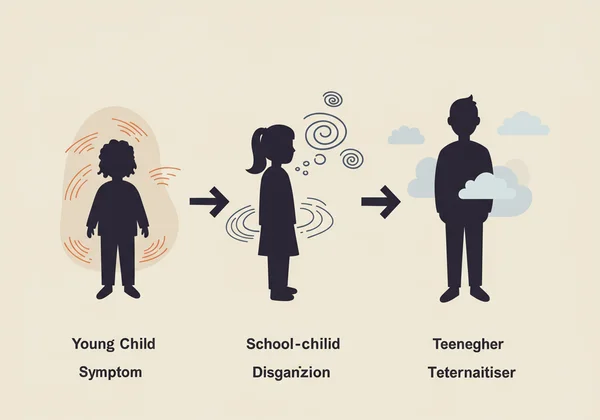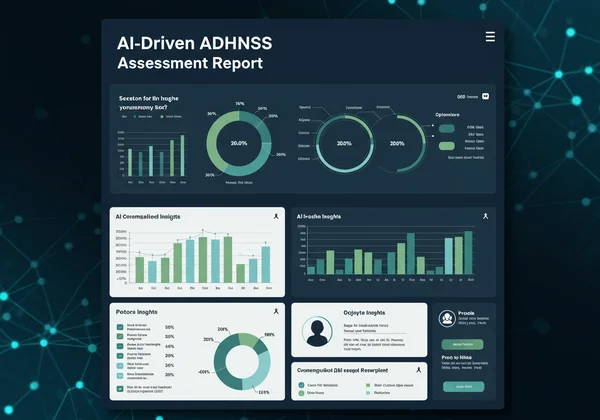ADHD Assessment for Kids & Teens: A Parent's Guide
July 27, 2025 | By Genevieve Hale
It's natural to have questions as you navigate your child's development. If you've noticed your child or teen struggling with focus, organization, or impulsivity, you might be wondering if it's more than just a phase. As a parent, seeking clarity is the first, most powerful step you can take. This guide is here to walk you through the process of an ADHD assessment for children and teens, helping you understand the signs and find a path forward. What are the main symptoms of ADHD in a child? Let's explore this together and see how a reliable screening can be your starting point for answers.

Feeling a mix of concern and uncertainty is completely normal. You want the best for your child, but figuring out the right support can be overwhelming. An online ADHD screening is a private, low-pressure way to gather initial information. It can transform your worries into a clear, actionable plan. If you're ready to move from wondering to understanding, you can take the first step with a scientifically-backed screening tool.
Recognizing Common ADHD Symptoms in Children & Teens
Attention-Deficit/Hyperactivity Disorder (ADHD) doesn't look the same in every child. Its presentation can change significantly with age, which can make it tricky for parents to identify. Understanding these age-specific signs is key to recognizing if your child might benefit from an assessment. These symptoms should be persistent and impact their daily life at home, at school, and with friends.
Understanding ADHD Signs in Young Children (Ages 3-7)
In preschoolers and early elementary students, the hyperactive and impulsive aspects of ADHD are often most prominent. While high energy is typical for this age, with ADHD it is more constant and disruptive.
- Constant Motion: They may seem to be "driven by a motor," squirming and fidgeting constantly, even during quiet activities like story time.
- Difficulty with "Quiet Play": Engaging in calm, seated activities is a significant challenge. They might run and climb excessively in inappropriate situations.
- Impulsivity: This can manifest as blurting out answers, having trouble waiting their turn in games or lines, and interrupting others frequently. Understanding these early patterns is crucial for early intervention.
How ADHD Presents in School-Aged Kids (Ages 8-12)
As academic and social demands increase, the inattentive symptoms of ADHD often become more apparent. While some hyperactivity may persist, difficulties with focus and organization take center stage, often impacting school performance.
- Inattention: They may struggle to pay close attention to details, make careless mistakes in schoolwork, and have trouble sustaining focus during lessons or while doing homework.
- Disorganization: A messy backpack, a disorganized desk, and frequently losing things like homework or school supplies are classic signs. They often have difficulty with time management and planning.
- Social Challenges: They might struggle to follow the rules of games or miss social cues, which can make it hard to maintain friendships. This is where an ADHD assessment questionnaire like the Vanderbilt scale is often used by professionals.
Identifying ADHD Characteristics in Adolescents & Teens
In teenagers, hyperactivity often lessens and can appear as internal restlessness or fidgeting. The challenges of inattention, disorganization, and impulsivity remain, but they manifest in ways that affect their growing independence and responsibilities.
-
Intensified Inattention: Procrastination on long-term projects is common, along with difficulty completing tasks and studying for exams. They may seem forgetful in daily activities and "zone out" during conversations.
-
Emotional Dysregulation: Teens with ADHD may experience intense emotional reactions, irritability, and low frustration tolerance, which can strain family and peer relationships.
-
Risky Behavior: Impulsivity can lead to making rash decisions without considering the consequences, which is a significant concern during the teenage years. An adhd assessment for teens is vital for providing support during this critical life stage.

The Importance of Early ADHD Assessment for Kids
Identifying potential ADHD early on is not about labeling a child; it's about unlocking their potential. An early adhd assessment for children provides the clarity needed to implement effective support strategies. This proactive approach can fundamentally change a child's developmental trajectory, turning challenges into opportunities for growth and building a foundation for lifelong success.
Impact on Learning, Behavior, and Social Development
When ADHD traits are not understood or supported, they can create a ripple effect across a child's life. In school, consistent difficulty with focus can lead to poor grades and a feeling of being "not smart enough," which damages self-esteem. This frustration can sometimes manifest as disruptive behavior or withdrawal.
Socially, missing cues or acting impulsively can make it difficult to form and keep friends, leading to feelings of loneliness. Recognizing that these are symptoms of a neurodevelopmental difference—not a character flaw—is transformative. It shifts the focus from blame to support, helping improve social development.
Benefits of Early Intervention and Support Pathways
Gaining clarity through an assessment is empowering. It opens the door to a network of support that can make a profound difference. With a better understanding of your child’s attention patterns, you can work with educators to create accommodations, like preferential seating or extended time on tests.
At home, you can implement strategies to help with organization and time management. Most importantly, it allows you to have open, honest conversations with your child about their brain, helping them understand their strengths and challenges. This builds resilience and self-advocacy. An assessment is the first step on these crucial support pathways. You can begin the screening today to start this positive journey.

Your Online ADHD Assessment as a First Step for Parents
In today's digital world, you no longer have to wait weeks or months for an initial consultation. A high-quality online adhd assessment serves as an accessible, reliable, and informative first step for parents. It's designed to give you a preliminary understanding from the comfort and privacy of your home, empowering you with the knowledge to decide on the next steps.
How Our Digital ADHD Screening Works for Young People
Our platform simplifies the screening process. We use guided questionnaires based on established and scientifically-validated scales, such as the Vanderbilt and Conners' scales, which are aligned with DSM-5 criteria. You'll answer a series of questions about your child's behaviors and patterns in different settings.
The process is straightforward and designed to be stress-free. A progress bar shows you how far along you are, and you can complete it whenever you have a quiet moment. We provide a comprehensive screening that covers the full range of ADHD symptoms, making it one of the most effective adhd assessment tools available online.
Advantages of a Private & Convenient First Assessment
One of the biggest hurdles for parents is the time, cost, and stigma associated with seeking a formal evaluation. An online screening removes these barriers. It is completely private and secure, allowing you to explore your concerns without pressure.
There are no long waiting lists or travel required. You can access the assessment anytime, anywhere. This convenience allows you to take action as soon as you feel the need, providing immediate insights that can help you have a more productive conversation with a pediatrician, school counselor, or psychologist.
Interpreting Your Child's Personalized AI-Driven Insights
What sets our platform apart is the option for a personalized AI-driven report. While a standard screening gives you a score, our AI analysis goes deeper. It provides personalized insights into your child's unique attention patterns, potential strengths, and specific challenges.
This report translates the clinical data into easy-to-understand language. It can help you see not just the challenges but also the potential strengths associated with an ADHD-like profile, such as creativity and hyperfocus. This detailed report is an invaluable tool to bring to your first professional consultation, helping you get a clear picture of your child's needs.

Empowering Your Child's Future with Clarity and Support
Understanding your child's unique needs is truly the most powerful tool a parent has. Transitioning from worry to clarity empowers you to effectively advocate for your child and provide the precise support they need to thrive. Recognizing the signs of ADHD and taking the step to get an initial screening is an act of love and proactive care that can shape a brighter future for your child.
An online ADHD assessment is a powerful, accessible first step on this journey. It equips you with valuable information, helps you understand your child’s unique mind, and prepares you for constructive conversations with professionals. You don't have to navigate this alone.
Ready to gain the clarity your family deserves? Start your online assessment today and unlock personalized insights to help your child succeed.
Frequently Asked Questions About Child & Teen ADHD Assessments
How can I get my child or teen assessed for ADHD?
The first step is often to gather information. An online screening tool, like the one offered on our platform, is an excellent starting point. It provides a structured report based on established scales that you can then take to a qualified healthcare professional, such as a pediatrician, child psychologist, or psychiatrist, for a formal evaluation and diagnosis.
Is an online ADHD assessment accurate for children?
High-quality online screening tools are designed to be highly reliable for identifying traits consistent with ADHD. Our assessments are based on scientifically validated questionnaires (like Vanderbilt and Conners') used by clinicians. While they provide a very accurate initial picture, it's crucial to remember they are a screening tool, not a formal diagnosis.
Can an online ADHD assessment formally diagnose my child?
No, an online assessment cannot provide a formal medical diagnosis. A diagnosis must be made by a qualified healthcare professional after a comprehensive evaluation, which may include clinical interviews, and gathering information from teachers. Our tool is designed to be the first step in this process, providing a detailed report to facilitate that professional consultation. To get your personalized AI report, start the assessment on our homepage.
What are the main symptoms of ADHD in a child?
The main symptoms fall into two categories: inattention (e.g., easily distracted, forgetful, trouble finishing tasks) and hyperactivity/impulsivity (e.g., constant fidgeting, inability to stay seated, interrupting others). A child may show symptoms from one or both categories, and these signs must be persistent and impact their daily functioning to be considered indicators of ADHD.
Disclaimer: This article is for informational purposes only and does not constitute medical advice. It is not a substitute for professional medical advice, diagnosis, or treatment. Always seek the advice of your physician or another qualified health provider with any questions you may have regarding a medical condition.